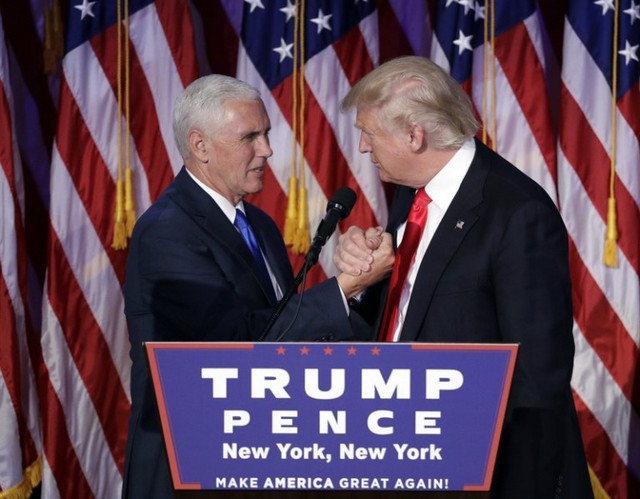By Ali Abunimah
On a day that most people expected not to see, we can say few things with certainty.
One of them is that Hillary Clinton would have been a disastrous president for those supporting the Palestinian struggle for their rights.
Her failed campaign pitched her as the natural successor to President Barack Obama, the Democrat who just unconditionally handed Israel the biggest military aid package in history.
During the Democratic primary campaign, Clinton marketed herself as a belligerent and violently hawkish allyof Israeli Prime Minister Benjamin Netanyahu against the Palestinian people.
She vowed to make blocking the nonviolent Palestinian-led boycott, divestment and sanctions (BDS) movement a priority of her would-be administration.
She went out of her way to campaign against the mildest efforts to hold Israel accountable, including appealing directly to members of her United Methodist Church last spring to vote against divestment from companies that assist and profit from Israel’s occupation.
Clinton positioned herself as an anti-Palestinian extremist at a time when the Democratic Party base showed itself more open than ever to embracing Palestinian rights.
Her extreme support for Israel is just one of the many ways she and her party operatives pandered to donorsand revealed themselves to be out of touch with large segments of the country they had taken for granted.
But Hillary Clinton will not be president.
President Trump
The only thing that can be said about President-elect Donald Trump with any confidence is that no one knows exactly what he will do.
Earlier in the campaign he insisted that he would be even-handed in dealings with Israelis and Palestinians, driving many of Israel’s most fanatical and neoconservative supporters into Clinton’s arms.
But facing a backlash, he quickly pivoted, promising Netanyahu he would recognize Jerusalem as the “undivided capital of the State of Israel,” and actively encouraging Israel to continue building colonial settlements in the occupied West Bank.
Trump still showed flashes of unwillingness to appease. After winning his party’s nomination in July, he brushed off a reporter’s question about whether he would follow the “tradition” of other Republican candidates and visit Israel.
“It’s a tradition, but I’m not traditional,” Trump shot back.
Even if these changes reveal an erratic man with no fixed views, Trump’s most pro-Israel positions don’t differ much in substance from the policies of Obama, on whose watch settlement construction more than matched the pace during the term of President George W. Bush.
Visceral fears
In his victory speech last night, Trump returned to a regular theme: “We will get along with all other nations willing to get along with us … We’ll have great relationships. We expect to have great, great relationships.”
That will be little comfort to people in the US and around the world whose visceral fears are stoked by the forces that helped propel Trump’s rise: his racist baiting and incitement against Muslims and Mexicans, his boasts about sexually assaulting women, his denial of global warming and his indulgence of anti-Semitic white supremacists, including the Ku Klux Klan, which gave him its endorsement.
The Israeli counterparts of these vile American racists are celebrating Trump’s victory today.
Netanyahu congratulated Trump, calling him a “true friend of Israel.”
“I am confident President-elect Trump and I will continue to strengthen the alliance between our two countries and bring it to greater heights,” the Israeli prime minister added.
Naftali Bennett, the Israeli education minister who has boasted about his killings of Arabs, hailed the coming Trump era.
“Trump’s victory is an opportunity for Israel to immediately retract the notion of a Palestinian state in the center of the country, which would hurt our security and just cause,” Bennett said.
But the so-called two-state solution was already dead and Clinton would not have changed that.
Fighting back
The Palestinian cause has already shifted to a struggle for equality against an entrenched system of Israeli occupation, settler-colonialism and apartheid anchored and rooted in support from the US bipartisan establishment.
Palestinians were not waiting for the result of the US election to decide which way their struggle would go.
Trump has won, but some things have not changed. Over the last decade, support for Palestinian rights has been rising in the United States, particularly among the young – and in the increasingly diverse Democratic Party base that has been utterly failed by its establishment leadership.
More than ever, people understand that US support for Israel comes not only from the same places where support for white supremacy, mass incarceration, unchecked police violence and US militarism and imperialism are strongest.
It also stems from the liberal, pro-human rights circles that championed Clinton, who more often than not equate colonizer and colonized, oppressor and oppressed, occupation and resistance.
This base has no choice now but to rally from its despair, which at any rate the election of either candidate would have precipitated, to keep organizing and fighting for its rights and the rights of people around the world.
The truth is, we had no choice but to wage that fight anyway.
Ali Abunimah is Co-founder of The Electronic Intifada and author of The Battle for Justice in Palestine, now out from Haymarket Books. Also wrote One Country: A Bold-Proposal to End the Israeli-Palestinian Impasse. Opinions are mine alone.
First published in Electronic Intifada
10 November 2016

